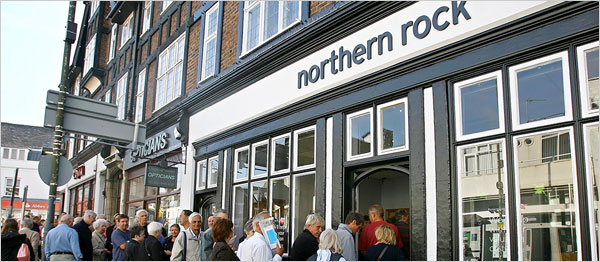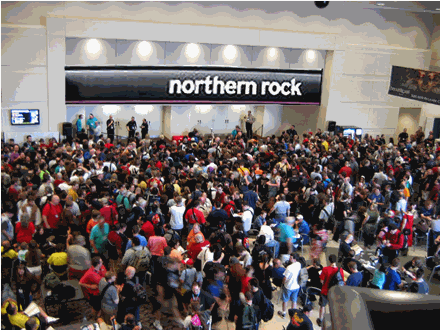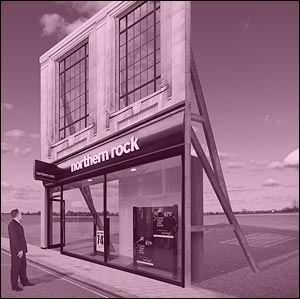|
Carol Stream, September 20, 2007
"There is no means of avoiding the final collapse
of a boom brought about by credit expansion. The alternative
is only whether the crisis should come sooner as a result
of a voluntary abandonment of further credit expansion,
or later as a final and total catastrophe of the currency
system involved." Ludwig von Mises

Friday (New York Times, 9/14/07)
Last Friday the New York Times carried an article about
a troubled British savings and mortgage bank, Northern Rock.
This was the first piece of financial news I read after
sending out my report
late night Thursday. The article was accompanied by the
above photograph of people standing in line in front of
one of its branches.

Monday
The article reported that the bank was in financial trouble
and had applied for emergency funds from the Bank of England.
I realized it was a classic bank run and, after checking,
indeed it was, the first in 100 years in the UK. The trouble
was not that the bank had heavily invested in re-packaged
US mortgage deals, it only was exposed for 1% to those,
but that it had funded its long-term loans with short-term
debt and they got into a snag servicing their short-term
obligations. Depositors perceived the bank's application
to the Bank of England with alarm and showed up to withdraw
their funds to the tune of $6 billion till the government
pacified the public on Tuesday September 17 by guaranteeing
all deposits in all UK banks (with tax payers' money of
course), which was a sharp U-turn from the previously announced
hands-off policy of "tough love" for risky banking
practices.

Wednesday
Not only did the depositors over-react, but the government
too, though its actions will have satisfied the broadly-based
interventionist-collectivist mind-set of the average cradle-to-the-grave-managed
Brit. Some equate the move with an effective nationalization
of the banking sector.
And while the Brits were given their generous pacifier
from Big Mother, US investors gave on the same day a sigh
of relief when the Federal Reserve Bank cut its prime rate
by half a percent, thereby delaying the reckoning for another
season by another enabling of cheap credit, but also cranking
up the rate of inflation with oil hitting $80, gold at $725
and the euro for the first time at $1.40. The pressure on
the stock market has diminished, but not for sure, nor for
long.
Sooner or later, the former chairman of the Federal Reserve
System Alan Greenspan will have some tough questions to
answer about all the bubbles, froth and irrational exuberance
in the financial markets he helped to create. For now he
is deflecting all responsibility to the Bush administration
for its reluctance to veto costly legislation and creating
the huge federal deficit, and is busy inflating the bubble
of his own reputation through his recently published autobiography
and its promotion. This one will burst too and probably
leave him open to charges of criminal negligence. He probably
will duck a verdict, for he is one sly obscurantist already
parsing the meaning of 'mistake' in his advantage in a clintonesque
manner.
Good night, and good fortune
|

